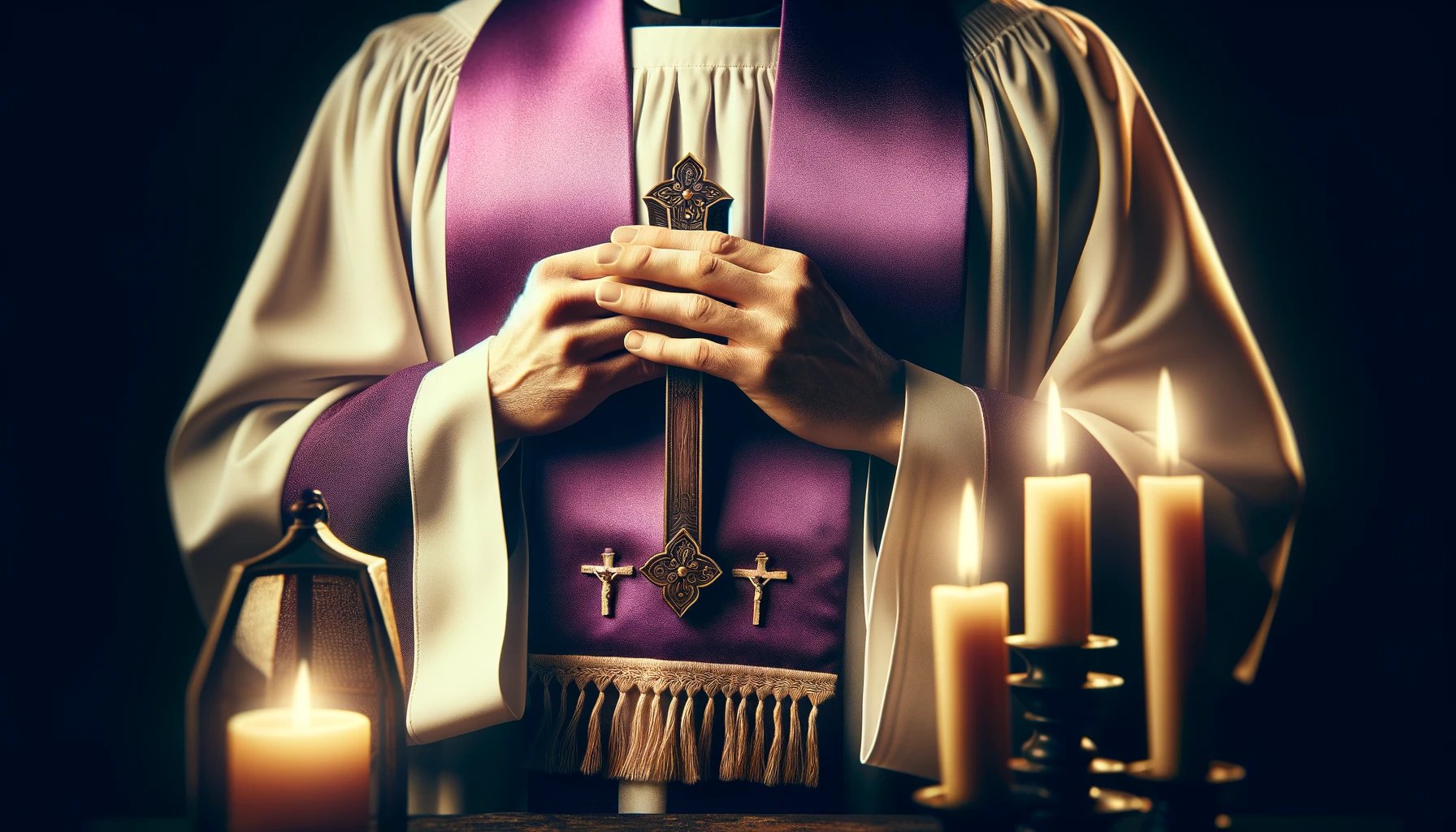Home>Theology and Spirituality>What To Pray During Communion


Theology and Spirituality
What To Pray During Communion
Published: February 24, 2024
Ericka Andersen, an editor at Christian.net, expertly merges digital strategy with content creation, focusing on faith and societal issues. Her communication skills enhance the platform's engaging narratives, fostering meaningful dialogue on belief's impact on society.
Discover powerful prayers to recite during communion that will deepen your spirituality and enhance your theological understanding. Explore meaningful communion prayers now!
(Many of the links in this article redirect to a specific reviewed product. Your purchase of these products through affiliate links helps to generate commission for Christian.net, at no extra cost. Learn more)
Table of Contents
Introduction
Communion, also known as the Eucharist or the Lord's Supper, holds a central place in the Christian faith. It is a sacred ritual that symbolizes the body and blood of Jesus Christ and commemorates the sacrificial act of love and redemption. As believers gather to partake in this solemn observance, it is a time of reflection, gratitude, and spiritual nourishment. The act of communion is deeply rooted in the teachings of Jesus Christ, who, during the Last Supper, shared bread and wine with his disciples, instructing them to do the same in remembrance of him.
The communion table represents a profound spiritual connection between individuals and their faith. It serves as a reminder of the ultimate sacrifice made by Jesus and the unifying bond it creates among believers. The act of partaking in communion is not merely a religious tradition but a profound expression of faith, humility, and reverence.
As believers approach the communion table, it is an opportunity to engage in heartfelt prayers that encompass gratitude, repentance, spiritual nourishment, and unity. These prayers are a vital aspect of the communion experience, allowing individuals to connect with the divine and seek solace, guidance, and renewal. Understanding the significance of communion and the power of prayer during this sacred observance can enrich the spiritual journey of believers and foster a deeper connection with their faith and community.
Read more: How To Pray During Lent
Understanding the significance of communion
Communion holds profound significance within the Christian faith, serving as a sacred and symbolic ritual that embodies the essence of Christ's teachings and sacrifice. At its core, communion represents a spiritual communion between believers and the divine, fostering a deep sense of unity, gratitude, and reverence.
The act of partaking in communion is rooted in the biblical account of the Last Supper, where Jesus Christ shared bread and wine with his disciples, imparting upon them the symbolic representation of his body and blood. This act of sharing a communal meal with spiritual significance has been passed down through generations, becoming a cornerstone of Christian worship and fellowship.
Communion serves as a poignant reminder of Christ's sacrificial love and redemptive power. It symbolizes the ultimate act of selflessness and atonement, as Jesus offered himself for the salvation of humanity. Through the partaking of bread and wine, believers are invited to reflect on the profound depth of Christ's love and the transformative impact of his sacrifice.
Moreover, communion embodies the concept of spiritual nourishment and sustenance. It is a time for believers to seek renewal and strength, both individually and collectively, as they partake in the elements that symbolize the sustenance of their faith. The act of consuming the bread and wine signifies a spiritual sustenance that transcends physical nourishment, providing believers with a sense of spiritual fortitude and sustenance for their journey of faith.
Additionally, communion fosters a sense of community and unity among believers. As individuals come together to partake in this sacred observance, they are reminded of their interconnectedness as members of the body of Christ. The communion table becomes a symbol of inclusivity, where all are invited to partake, regardless of background, status, or circumstance. This inclusivity reflects the universal love and acceptance espoused by Jesus Christ, emphasizing the unity and fellowship that transcends individual differences.
In essence, communion holds multifaceted significance, encompassing themes of sacrifice, love, unity, and spiritual nourishment. It serves as a tangible expression of faith and a sacred bond that unites believers in their shared devotion to Christ. Understanding the profound significance of communion enriches the spiritual journey of believers, fostering a deeper appreciation for the timeless tradition and its enduring relevance in the Christian faith.
Prayers of thanksgiving
Prayers of thanksgiving form an integral part of the communion experience, allowing believers to express profound gratitude for the blessings, grace, and redemptive love bestowed upon them. As individuals gather around the communion table, the act of offering prayers of thanksgiving becomes a poignant expression of appreciation for the sacrificial love of Jesus Christ and the countless blessings that enrich their lives.
During the communion service, prayers of thanksgiving serve as a heartfelt acknowledgment of the transformative power of Christ's love and the profound impact it has on the lives of believers. It is a time to reflect on the abundance of grace and mercy extended to humanity through the selfless act of sacrifice, symbolized by the bread and wine. Through prayers of thanksgiving, believers express their gratitude for the unmerited favor and divine benevolence that permeate their existence.
Moreover, prayers of thanksgiving during communion provide a sacred space for individuals to reflect on the personal blessings and provisions they have received. It is a moment to express gratitude for the gift of life, the presence of loved ones, and the daily sustenance that sustains them physically, emotionally, and spiritually. By offering prayers of thanksgiving, believers cultivate a spirit of appreciation and mindfulness, recognizing the abundance of blessings that enrich their lives.
Additionally, prayers of thanksgiving serve as a unifying force, bringing believers together in a collective expression of gratitude. As individuals lift their voices in thanksgiving, they create a harmonious symphony of appreciation, acknowledging the boundless love and provision of the divine. This collective act of gratitude fosters a sense of unity and fellowship, reinforcing the interconnectedness of believers as they come together to partake in the sacred observance of communion.
In essence, prayers of thanksgiving during communion encapsulate the profound sense of gratitude that permeates the Christian faith. It is a time for believers to express heartfelt appreciation for the redemptive love of Christ, the abundant blessings in their lives, and the unifying fellowship shared among the community of faith. Through prayers of thanksgiving, believers embrace the transformative power of gratitude, fostering a deeper connection with their faith and a heightened awareness of the divine presence in their lives.
Prayers for forgiveness and cleansing
Prayers for forgiveness and cleansing hold profound significance during the communion experience, serving as a sacred opportunity for believers to seek spiritual renewal, absolution, and reconciliation. As individuals gather around the communion table, the act of offering prayers for forgiveness and cleansing becomes a poignant expression of humility, repentance, and a sincere desire to be cleansed from the burdens of sin and transgression.
At the heart of communion lies the concept of redemption and reconciliation. Through prayers for forgiveness, believers acknowledge their imperfections and shortcomings, seeking divine mercy and grace to cleanse their hearts and minds. This act of humility reflects the recognition of human fallibility and the earnest desire for spiritual purification. As individuals engage in prayers for forgiveness, they embrace the transformative power of grace, acknowledging the need for divine intervention in the process of inner cleansing and renewal.
Moreover, prayers for forgiveness and cleansing foster a spirit of repentance and reconciliation. Believers are encouraged to examine their hearts, acknowledging areas of moral and spiritual inadequacy, and seeking divine pardon and restoration. The communion table becomes a sacred space for individuals to lay bare their vulnerabilities and seek the restorative touch of divine forgiveness. Through prayers for cleansing, believers express a genuine desire to be purified from the burdens of guilt, shame, and moral transgression, embracing the promise of spiritual renewal and restoration.
Additionally, prayers for forgiveness and cleansing create a sense of communal solidarity and empathy. As individuals engage in this sacred act of seeking forgiveness, they are reminded of the universal need for grace and absolution. The communion experience becomes a collective journey of repentance and renewal, as believers come together to seek forgiveness and cleansing, fostering a spirit of compassion, understanding, and mutual support. This communal expression of humility and repentance reinforces the interconnectedness of believers, emphasizing the shared pursuit of spiritual wholeness and reconciliation.
In essence, prayers for forgiveness and cleansing during communion embody the profound yearning for spiritual renewal, absolution, and reconciliation. It is a time for believers to humbly seek the transformative power of divine forgiveness, acknowledging their vulnerabilities and embracing the promise of inner cleansing and restoration. Through prayers for forgiveness and cleansing, believers embark on a sacred journey of repentance, renewal, and reconciliation, fostering a deeper connection with their faith and a profound sense of spiritual liberation.
Prayers for spiritual nourishment
Prayers for spiritual nourishment hold profound significance during the communion experience, serving as a sacred invocation for the sustenance and enrichment of the inner spiritual being. As believers gather around the communion table, the act of offering prayers for spiritual nourishment becomes a poignant expression of the earnest desire for spiritual growth, enlightenment, and a deepening connection with the divine.
At the heart of communion lies the concept of spiritual sustenance and nourishment. Through prayers for spiritual nourishment, believers express a genuine longing for the enrichment of their innermost being, seeking divine guidance, wisdom, and a heightened awareness of the transcendent truths that underpin their faith. This act of supplication reflects the recognition of the profound spiritual hunger that resides within each individual, yearning for fulfillment, enlightenment, and a deeper communion with the divine presence.
Moreover, prayers for spiritual nourishment encompass the quest for inner transformation and enlightenment. Believers aspire to be spiritually fortified, seeking the sustenance of divine grace, wisdom, and insight to navigate the complexities of life with clarity, purpose, and resilience. The communion table becomes a sacred space for individuals to seek spiritual nourishment, embracing the promise of inner illumination, growth, and a profound communion with the divine.
Additionally, prayers for spiritual nourishment create a sense of communal aspiration and solidarity. As individuals engage in this sacred act of seeking spiritual enrichment, they are reminded of the universal quest for spiritual fulfillment and enlightenment. The communion experience becomes a collective journey of spiritual aspiration and growth, as believers come together to seek nourishment for their innermost being, fostering a spirit of shared yearning, understanding, and mutual support. This communal expression of spiritual longing reinforces the interconnectedness of believers, emphasizing the shared pursuit of spiritual growth and enlightenment.
In essence, prayers for spiritual nourishment during communion embody the profound yearning for inner enrichment, enlightenment, and a deepening communion with the divine. It is a time for believers to earnestly seek the transformative power of spiritual nourishment, acknowledging their spiritual hunger and embracing the promise of inner illumination and growth. Through prayers for spiritual nourishment, believers embark on a sacred journey of spiritual aspiration, enlightenment, and communion, fostering a deeper connection with their faith and a profound sense of spiritual fulfillment.
Read more: During Advent What Do We Pray For
Prayers for unity and fellowship
Prayers for unity and fellowship hold profound significance during the communion experience, serving as a sacred invocation for the strengthening of bonds among believers and the fostering of a deep sense of community and solidarity. As individuals gather around the communion table, the act of offering prayers for unity and fellowship becomes a poignant expression of the earnest desire for harmonious relationships, mutual support, and a shared commitment to the principles of love and compassion.
At the heart of communion lies the concept of unity and fellowship. Through prayers for unity, believers express a genuine longing for the strengthening of bonds within their faith community, seeking divine guidance and grace to nurture a spirit of inclusivity, understanding, and mutual respect. This act of supplication reflects the recognition of the profound need for unity and fellowship, transcending individual differences and fostering a sense of collective belonging and shared purpose.
Moreover, prayers for fellowship encompass the aspiration for a deep sense of community and mutual support. Believers seek the sustenance of divine grace to cultivate an environment of empathy, encouragement, and shared spiritual journey. The communion table becomes a sacred space for individuals to seek fellowship, embracing the promise of a supportive and nurturing community where all are valued, accepted, and embraced in their diversity.
Additionally, prayers for unity and fellowship create a sense of communal aspiration and solidarity. As individuals engage in this sacred act of seeking unity and fellowship, they are reminded of the universal quest for harmonious relationships and a supportive community. The communion experience becomes a collective journey of fostering unity and fellowship, as believers come together to seek divine guidance and grace in nurturing a community characterized by love, compassion, and mutual respect. This communal expression of aspiration for unity reinforces the interconnectedness of believers, emphasizing the shared pursuit of a cohesive and supportive faith community.
In essence, prayers for unity and fellowship during communion embody the profound yearning for harmonious relationships, mutual support, and a deep sense of community and solidarity. It is a time for believers to earnestly seek the transformative power of divine grace in nurturing unity and fellowship, acknowledging the importance of inclusive and supportive relationships within their faith community. Through prayers for unity and fellowship, believers embark on a sacred journey of fostering harmonious relationships, mutual support, and a deep sense of community, fostering a deeper connection with their faith and a profound sense of belonging.
Conclusion
In conclusion, the act of partaking in communion is a deeply profound and sacred observance that encompasses themes of gratitude, repentance, spiritual nourishment, and unity. It serves as a tangible expression of faith, humility, and reverence, inviting believers to engage in heartfelt prayers that enrich their spiritual journey and foster a deeper connection with their faith community.
Throughout the communion experience, prayers of thanksgiving serve as a poignant acknowledgment of the transformative power of Christ's love and the countless blessings that enrich the lives of believers. It is a time for individuals to express profound gratitude for the redemptive love of Jesus Christ and the abundant blessings that permeate their existence, fostering a spirit of appreciation and mindfulness.
Moreover, prayers for forgiveness and cleansing create a sacred space for believers to seek spiritual renewal, absolution, and reconciliation. This act of humility and repentance reflects the universal need for grace and the earnest desire for inner cleansing and restoration, fostering a sense of communal solidarity and empathy among believers.
Additionally, prayers for spiritual nourishment embody the profound yearning for inner enrichment, enlightenment, and a deepening communion with the divine. It is a time for believers to earnestly seek the transformative power of spiritual nourishment, acknowledging their spiritual hunger and embracing the promise of inner illumination and growth.
Furthermore, prayers for unity and fellowship foster a deep sense of community and solidarity, nurturing harmonious relationships, mutual support, and a shared commitment to the principles of love and compassion. This communal expression of aspiration for unity reinforces the interconnectedness of believers, emphasizing the shared pursuit of a cohesive and supportive faith community.
In essence, the communion experience, enriched by heartfelt prayers, serves as a spiritual anchor that unites believers in their shared devotion to Christ. It is a time of reflection, gratitude, and spiritual nourishment, fostering a deeper connection with the divine and a profound sense of belonging within the faith community. As believers partake in communion and offer prayers that encompass thanksgiving, forgiveness, spiritual nourishment, and unity, they embark on a sacred journey of faith, renewal, and communal solidarity, enriching their spiritual lives and reinforcing the timeless significance of this sacred observance.














